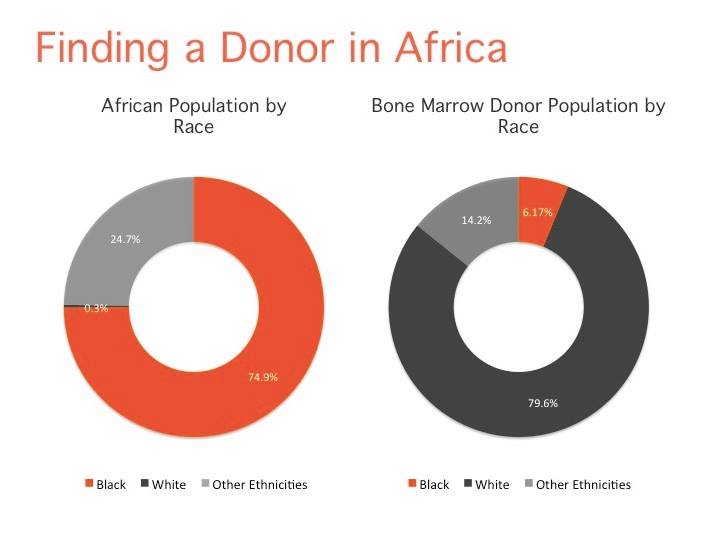Cancer is an emerging public health problem in Africa. The continent recorded about 715,000 new cancer cases in 2008, and 542,000 cancer deaths. According to the International Agency for Research on Cancer (IARC), these numbers are projected to double in 2030. But despite this growing burden, cancer receives low public health priority in Africa. This is why the likes of Ronke Babalakin, and her team is stepping up to the challenge of fighting blood cancer and sickle cell anaemia in Africa with a bone marrow program – Ara.
But just how prevalent and devastating are blood cancer and sickle cell anaemia in Africa? Without referencing statistics from health bodies and organizations, it is highly probable that you either know someone who is affected by or has died from one of these conditions. Blood cancer – Leukaemia, lymphoma and Myeloma – are types of cancer that can affect bone marrow, the blood cells and lymph nodes — all integral parts of the body’s circulatory system.
In 2008, Leukaemia and Lymphoma ranked 6th and 9th as the causes of death per 100,000 men in Africa. They ranked 9th and 5th in age adjusted deaths per 100,000 for females in Africa. There are also predictions that by 2050 the number of babies born with sickle cell anaemia will rise to 140,000 per year in Nigeria and 45,000 per year in the DRC.
Bone Marrow transplant is the only known cure for blood cancers and for sickle cell anaemia. However, the major drawback for blood cancer and sickle cell anaemia patients of African descent in need of transplants is the inadequate number of African bone marrow donors. The other alternative is the use of umbilical cord blood from new-borns, but the difficulty in sourcing cord blood makes it less popular.
The U.S houses the largest bone marrow registry in the world with 3.34 percent of the US population registered as bone marrow donors. In a sharp contrast, only 0.006 percent of the African population is registered on the Nigerian and South African Bone Marrow Registries. Currently, only 3,000 out of the potential 70,000 potential donors on the African Bone Marrow Registry are of Africa descent. The rest are white and other ethnicities.

To reduce blood cancer and sickle cell anaemia prevalence in Africa, Ara — a grassroots volunteer initiative founded in 2014 by Ronke Babalakin is on a mission to recruit bone marrow donors and promote cancer control advocacy. Having lost three friends to Leukaemia, “I thought to myself that this was a serious problem and decided to do something about it,” she said.
Ara’s short term goal is to recruit 30,000 bone marrow donors in Africa by the end of 2018. Long-term, the non-profit organization intends to provide the logistics and infrastructure necessary to ensure the seamless recruitment of donors in cities all over Africa. To achieve this, Ara has partnered with several organisations and individuals to promote the drive for bone marrow donors. One such organization is the Nigerian bone marrow registry, founded by Seun Adebiyi, who is also a member of Ara’s founding team.
Ara works closely with DKMS (deletebloodcancer.org), one of the largest bone marrow recruiters in the world. The organization helps Ara conduct the Human Leukocyte Antigen (HLA) typing. The HLA system is the locus of genes that encode for proteins on the surface of cells that are responsible for regulation of the immune system in humans. The HLA marker is crucial to a bone marrow transplant as patients and donors need to have closely matched HLA markers for a blood stem cell transplant to succeed. Ara has set sights on getting international accreditation for HLA typing labs in Nigeria and across Africa in the near future.
The costs implications of a bone marrow transplant widen between developed and developing countries, largely because of exchange rates. In the US, bone marrow transplants can cost between $80000 and $400000. But if a close match from a bone marrow donor is found, the survival rates are high – between 60 and 70 percent- so it is well worth it.
To decrease the amount of time a blood cancer or sickle cell patient needs to find a donor match, Ara hopes to recruit bone marrow donors through various donor drives. The first donor drive is set to launch in Lagos, Nigeria on December 21, 2015. Ara plans to model and advance similar drives in Ghana, Kenya, and South Africa in the coming years.
Regarding the initiative, Ronke said, “What I am trying to do now is to get it in people’s faces. Get them asking questions, get them learning about the potential solution for blood cancer and anaemia. And get them interested in being involved in making these solutions happen and take Africa just a little step further in development.”
Ara has launched an Indiegogo campaign to raise funds for their December Drive. Currently, they’ve raised over $1,000. You can donate to the campaign here, and visit their Twitter and Facebook
For more insight, click to listen to the podcast below








